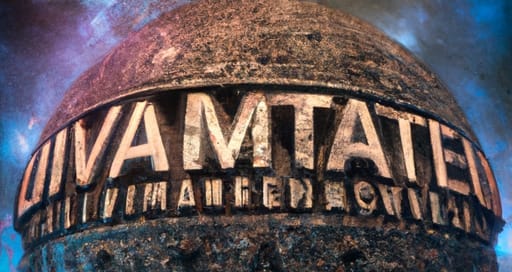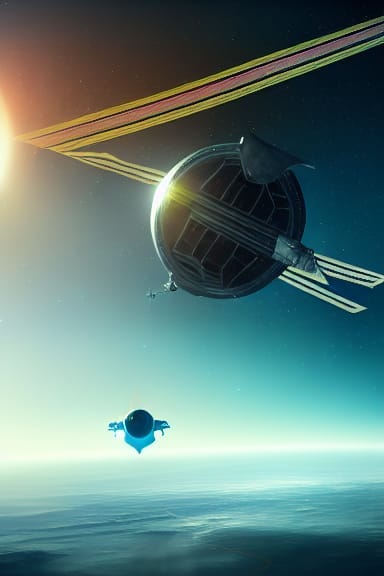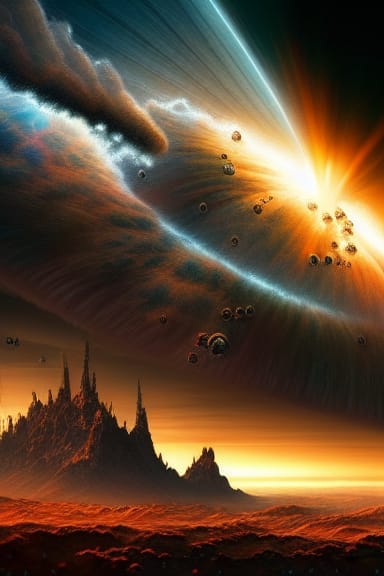Let’s leave genetics for a moment and go on a fanciful trip to illustrate a point…
_____
It’s 2156 and you are on the Intergalactic Starship The Improbable, searching the vastness of space for any signs of life. You’ve been woken up by the ship’s AI, Karen, from your suspended animation pod.
“We have arrived at Quadrant 25497 and I’ve detected possible lifeforms,” announced Karen in that typical male, oscillating to female, and then back to male voice with random accents from around the world, typical of your starship’s vintage - irritable but equitable.
You make your way to the observation deck to see a large spherical object reminiscent of the Death Star from that old 20th century story Star Wars.
A landing party is organised and you are selected, as the ships mathematician, to be part of the encounter.
As your landing vehicle approaches the Death-Star-like object you see written, across what could possibly be construed as its ‘equator’ line, the words “Univers-O-Matic™” (in raised Times New Roman font), stretching out for kilometres in a polished silver finish. Underneath in smaller lettering were the words “Build Your Own Life Sustaining Universe”, and in very small lettering below that again were the words, “Conditions Apply.”
Once you landed safely inside the large, yet completely empty, landing pad and the outer doors closed behind you, a rush of air filled the void. Surprisingly the atmosphere and artificial gravity caters to you and your team perfectly.
A screen splutters to life above the large door that is obviously the way into the complex.
“Who is it?” Blurts out someone with an English accent.
An old man appears on the screen seemingly rather agitated. Well mostly his large nose filled the screen but enough of his face also flashed by momentarily as he tried to adjust the camera. Long white hair in a tangled mess suggests he wasn’t expecting guests.
“What do you want?” It seemed he was rudely interrupted from much needed sleep, that would explain the hair, or something like that.
“Ah… we are from a neighbouring galaxy… and we saw your…”
“Do you want to make a UNIVERSE?!” The old man interrupted, still rather agitated.
You look around at each other and shrug your shoulders.
“Well I guess so… Yes, we would like to make a universe!” Everyone nods in agreement. No one has any idea what’s happening.
“That’ll be a fiver,” he says with a bit of a sigh, as if he’s had to make that very same request for “a fiver” a hundred times today.
The old man automatically reaches for a lever to his side and trap doors open up beneath you and your team as you fall into a tube of some sort. Before you realise what is happening the trap doors close above you, the tube opening closes and you are propelled forward at a high speed by a massive punch of compressed air.
After a few harrowing twists and turns you spill out into a very large room. You gather yourselves together and notice the room has a lot of spinning wheels, some the size of a dinner plate and others with a diameter reaching hundreds of feet into the air. It was like a huge muddle of vertical roulette wheels, obviously some sort of analogue calculator you think to yourself.
“What’s this all for,” you ask the old man who’s now standing beside you.
“This is the ‘Room of Fine Tuning’,” he says with an air of pride, looking up toward the ceiling.
“And what happens here?” You ask as he continue is upward gaze.
“This is where the parameters of your universe are decided,” he explained, still looking up at the largest wheel with a sense of awe.
“Ah…, OK, so we just set whatever parameters we like?”
“Noooo me laddie, you have to spin the exact right numbers for your life sustaining universe to come into existence,” he says in a measured and serious tone, thick with what you now believe is a Scottish accent (you think you can hear an orchestral underscore emphasising the weightiness of the moment).
“So what are the right numbers then?” The obvious question to ask in the given situation.
“Well me laddie I just can’t help you there, it’s a random thing you know?” He smiles rather annoyingly.
“What do you mean it’s a random thing?” You fire back.
“You don’t think a universe is anything but a random event… do you?”
“No, no. No, of course not,” you respond, a little confused. “So what did my five quid just purchase me?”
“A chance to SPIN TO WIN!” A sudden fanfare blasts out from somewhere high above in the enormous room and everyone reflexively reaches for their sidearm. (You also realise the orchestral underscore must have been real and not your imagination after all).
After the old man explains to you that each wheel represents certain variables and conditions that need to be present for your universe to come into existence he takes you to the first set of wheels - They are enormous. He explains that you get one spin on each wheel and whatever numbers they land on will determine if your universe will be born and be able to sustain life. If it doesn’t you have to pay another five pounds for another go.
The wheels, a lot of them, were arranged in a number of groupings, one group called “Initial Conditions”, another “Expansion”, another “Life”.
The “Initial Conditions” set of wheels were a couple of dozen that set the parameters for the initial conditions for matter and energy, gravitation, electromagnetism, strong and weak nuclear forces, the masses of every elementary particle, and so on. All requiring very specific tolerances to produce the right conditions for the birth of a universe that would ultimately support life.
The “Expansion” set of wheels included conditions such as expansion rate, the cosmological constant, gravitational attraction strength, a bunch of ratios like the ratio between electromagnetic forces and the strong nuclear force.
The “Life” set of wheels were to determine the exact conditions for the formation of the elements to create beryllium and helium and then subsequently carbon. Further wheels had something to do with combinations of elements and the required conditions - these were very large.
All the wheels had a lot of numbers around the edge that could only be seen with a high powered microscope, and some looked like they were blurry and glitching.
“What’s with the blurry, glitchy wheels over there?” you ask the old man.
“Higher dimensional wheels me laddie!” he says puffing out his chest.
“What does that mean?”
“Well look over at that one in the Expansion set. That’s the wheel for all the possibilities of the cosmological constant. There are 10 to the 90th power of possibilities and you have to get one specific one. We can’t fit 10 to the 90th power of possibilities on a normal wheel so we have to use a higher dimensional wheel so it can all fit into one spin of the wheel,” the old man explains.
“What! 10 to the 90th power! There are only 10 to the 80th power, or something like that, particle in the known universe!” You say, suddenly realising the difficulty of randomly landing on the one special number required. The old man just raised his bushy eyebrows and nodded in agreement.
Exasperated you ask the old man where to start, which wheel to spin first.
“Ahhh… Spin the ‘Low Entropy State’ wheel! It’s a doozy!” Another fanfare blasts from somewhere high up in the ceiling.
You look over at one of the blurry, higher dimension wheels, flickering like a poorly projected image on a moving canvas.
“What are the chances I get the right number on this one?” You ask.
“Well you have one chance in 10 to the 10th to the 123rd power,” he says with a bit of a smirk.1
“Ah, what? Ten to the power of ten to the power of one hundred and twenty three?”
“That’s right me laddie,” he laughed. The ‘laddie’ thing was wearing thin.
You realise that it was going to be difficult to land on the one correct number. You also realise that even if you did land on that one chance out of 10 to the 10th to the 123rd power, you still had many dozens of other wheels to spin and land on the right number. If one was incorrect your life bearing universe would fail. You are a mathematician but these numbers are beyond you.
Heck, just spin the damn wheel.
The fanfare erupted once again into the vast cavern of a room and the Low Entropy State wheel flashed width colourful lights and a deep rumble. Suddenly it stopped and a huge red cross flashed across the room and the sound of a buzzer from those old game shows indicated that the number was WRONG! You didn’t get the right value to define the entropy state of a particle at the singularity of the Big Bang to kick-start your very own universe. No surprise really. And no point in going on if the very first variable was unable to even start anything.
“Woohoo! Want another go me laddie?” The old man was clearly in his element. “That’ll be another fiver if you don’t mind,” he said holding out his hand.
Ignoring the old man you flip open your communicator, “Karen, we are coming back to the ship, give us some directions to the landing bay. I’m not going back into that tube!”
____
The fine-tuning of the universe means there are a multitude of variables required to be within very small tolerances for matter to exist in the context of our universe. The fine-tuning of elements required for life requires another set of variables with extremely fine tolerances plus reverse entropy (flipping the second law of thermodynamics on its head) to produce the sort of information we see (like the genome). Just saying - “if we give it long enough, it will come about” - just doesn’t cut it.
“This is an extraordinary figure. One could not possibly even write the number down in full, in the ordinary denary notation: it would be `1' followed by 10 to the 123rd successive `0 's! Even if we were to write a `0' on each separate proton and on each separate neutron in the entire universe-and we could throw in all the other particles as well for good measure-we should fall far short of writing down the figure needed. The precision needed to set the universe on its course is seen to be in no way inferior to all that extraordinary precision that we have already become accustomed to in the superb dynamical equations (Newton's, Maxwell's, Einstein's) which govern the behaviour of things from moment to moment.” (Roger Penrose)






Unbelievably big numbers Winston. Now you have me wondering what the probability is of you selecting Karen as a name for the AI. 🙄
Well ... there is this: https://en.wikipedia.org/wiki/Anthropic_principle
Don't get me wrong, I am very far from an atheist. But there is a bit of a selection bias going on here. Only beings living in a life-sustaining universe would ever be capable of observing their cosmological constants. If we posit a true infinity of universes, the few that are life-sustaining will end up containing bewildered beings who wondered how the hell they got there. But whence the infinity, eh?